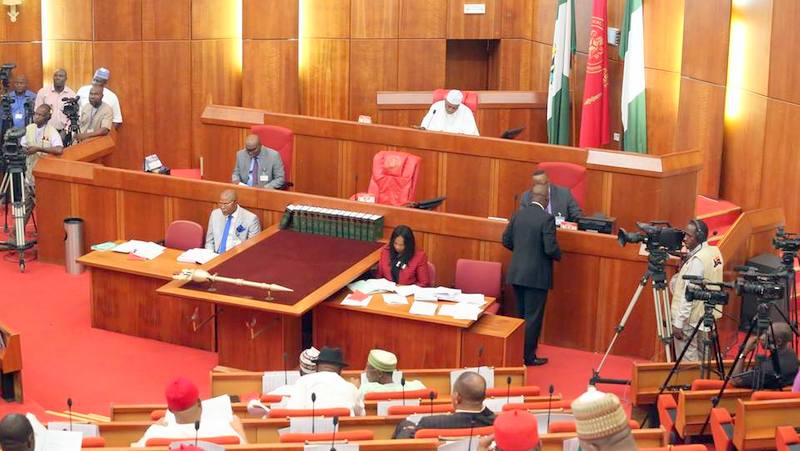Don’t Return Nigeria Into Another Debt Trap- Senate, NSIA Warn FG
The Senate and Nigeria Sovereign Investment Authority, NSIA, Wednesday warned the Federal Government against returning the country into a debt trap.
Though the Senate eventually approved President Muhammadu Buhari’s request for $2.78 billion Eurobond, it reiterated the concerns of the Bretton Woods institutions over rising public debt in Nigeria.
The World Bank and the International Monetary Fund, IMF, at the just-concluded annual meetings in Indonesia had warned that a trend of rising public debt in developing countries was undermining economic development in the affected countries.
The NSIA also warned that it is suicidal for the nation, the states and some businesses in the country to borrow dollar-denominated funds from the international financial market to finance infrastructure development in the country.
However, the Senate’s approval for the issuance of $2.786 billion from the international capital market was as contained in the 2018 Appropriation Act.
It also approved the issuance of $82.54 million to refinance the balance of $500 million matured Eurobond in the international capital market and advised the Federal Government to do everything possible to reduce or limit its request for more external borrowing and source other means of generating revenue internally. According to the Senate, this will help avoid a cleverly managed re-conquest of the country through a debt overhang.
Resolutions of the Senate were sequel to the consideration of the report on the new external capital raising presented by Chairman of the Committee on Local and Foreign Debt, Senator Shehu Sani (APC, Kaduna Central).
Presenting the report, Senator Sani said: “That the issuance of both USD2.786 billion and USD 82.54 million from International Capital Market is for the part- financing of 2018 Budget, with particular interest to finance key infrastructure projects proposed in the 2018 Budget.
“The committee also observed that the capital raising of USD2.786 billion will result in a portfolio mix of Domestic Debt- 68 percent and External Debt- 32%, which is an improvement over the ratio of 70:30 as at June 30,2018.
This brings the debts portfolio mix closer to the target of 60:40. “The committee further observed that the issuance of these bonds will contribute to the implementation of the Debt Management Strategy which seeks to reduce the cost of borrowing, lengthen the maturity of the public debt stock, free- up space in the domestic market for other borrowers and help to increase Nigeria’s external reserves.
It would be recalled that President Muhammadu Buhari had written the Senate, seeking the approval of the lawmakers to raise external funding for the 2018 budget.
In the letter dated July 23, and read last week by the Senate President, President Buhari said the sum as approved in the 2018 Appropriation Act, would be used to finance deficits and key infrastructure projects in the 2018 budget.
The Senate approval came as the Federal Executive Council, FEC, presided over by President Muhammadu Buhari, also yesterday approved six transaction parties to advise the federal government on the Eurobonds issuance and other securities at the international capital market. The transaction parties are Citigroup Global Market Limited and Standard Chartered Bank as joint managers; FSDH Merchant Bank Limited as financial adviser; White And Case LLP, Banwo and Ighodalo as legal advisers and Africa Practice Limited as technical adviser on communication.
Minister of Finance, Zainab Ahmed, while briefing journalists in Abuja, said the transaction parties were expected to advise the government on “the structure and timing, as well as, documentation for the issuance” of the Eurobonds and other securities.
She said the approval was part of government’s commitment to the implementation of the 2018 Appropriation Act, adding that “consistent with government’s policy on development of infrastructure, the proceeds of the euro bond issuance will be deployed to fund critical capital projects in the 2018 Appropriation Act.”
An estimated N849.673 billion ($42.78 billion) is expected to be externally borrowed to finance part of the deficit in the 2018 appropriation Act. While there are worries over Nigeria’s rising debt profile, which is estimated to have grown by 145 percent in the past three years, the government says there is room for more debt for Nigeria.
Explaining the nation’s debt-to-GDP ratio, Udo Udoma, Minister for Budget and National Planning, said Nigeria had a sustainable debt profile. “Nigeria has a sustainable debt profile with ample room to borrow more whenever we may require doing so. Nigeria runs no debt risk and the Debt Management Office, DMO, carries out an annual Debt Sustainability Analysis to ensure that we stay that way,” he said.
Meanwhile, the Managing Director of Nigeria Sovereign Investment Authority, NSIA, Mr. Uche Orji, warned that it was suicidal for Nigeria and some businesses in the country to borrow dollar-denominated funds from the international financial market to finance infrastructure development in the country.



